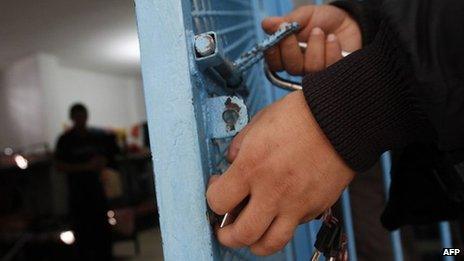Probation service bidding begins for contracts worth £450m
- Published

Supervisors will be paid according to how well they prevent reoffending in inmates' first year after release
Bidding has begun for probation service contracts worth £450m across England and Wales, the Ministry of Justice has announced.
Payment-by-results contracts are to be split between private companies and charities in 20 English regions and one Welsh region, officials said.
They will supervise 225,000 low and medium-risk offenders each year.
Senior probation officers have condemned the plans as "a disgrace and total failure".
The competition will continue through 2014, with contracts awarded by 2015.
Under a system of 21 contracts, the voluntary groups, charities and private companies will only be paid in full if a certain proportion of offenders do not commit further crimes.
The government also announced the creation of a new public sector organisation known as the National Probation Service (NPS), which will be in charge of supervising and rehabilitating 31,000 high-risk offenders.
The NPS will provide initial risk assessments of all offenders. If a low or medium-risk inmate becomes high-risk, contract providers will then escalate the offender to be overseen by the NPS.
'Extremely encouraging'
"Each year around 600,000 crimes are committed by those who have already broken the law - that is a dreadful figure and I am determined to bring it down," Justice Secretary Chris Grayling said in a statement.
"The scale of interest in these contracts from so many diverse and creative organisations is extremely encouraging. This is great news for the public who will finally benefit from the best of the private and voluntary sectors, working together with the public sector, to cut reoffending."
More than 700 organisations from across the world, including hundreds of British firms, have already expressed interest in the contracts, Mr Grayling added.
In response to the announcement, the probation service union Napo warned the sector was experiencing "the fight of its life", as 18,000 people faced "total uncertainty about their future employment".
Staff "will be asked to express an interest about which sector they want to work in" without knowing who the employer would be, the union said.
Napo general secretary Ian Lawrence said: "Not caring about public safety is a downright disgrace and a total failure on their part (the government) to fulfil their duty to society."
Napo members protested against the changes outside the Ministry of Justice on Thursday and a spokeswoman told the BBC it was a "racing certainty" that there would be industrial action eventually.
Shadow justice secretary Sadiq Khan called the penal reforms "a reckless gamble" with public safety.
"Let's not forget that [Mr Grayling's] plans involve community supervision of 200,000 serious and violent offenders being handed over to private companies, and the fragmentation of our probation service," he said.
"Therefore, it's only right that Parliament should scrutinise these proposals, given they have a very real effect on the day-to-day safety of communities that MPs represent."
The Ministry of Justice confirmed that the private security companies Serco and G4S would be allowed to bid for probation service contracts.
However, it said the firms would not be awarded any contracts until a government-wide audit of contracts held by the companies was completed.
The audit was triggered by revelations that both firms had overcharged the government for criminal-tagging contracts.
As part of the new probation service plans, every inmate leaving jail - including those who have spent just a few days in prison - will have to complete a year-long period of supervision that will see them returned to custody if they reoffend.
Currently, offenders who have a sentence of less than 12 months are not supervised on release.
Government figures show that while 46.9 % of all adult prisoners commit a further offence within a year of release, the reoffending rate is significantly higher - 58.2% - for those sentenced to less than a year.
Long-term offenders will continue to be monitored by the probation service for about the same length of time as their prison sentence.
Meanwhile, all prisoners will receive support for a minimum of 12 months to help them find accommodation, get a job or training and tackle any alcohol or drug problems they may have.
- Published9 May 2013
- Published9 May 2013
- Published9 May 2013
- Published9 May 2013
- Published9 May 2013
- Published9 May 2013
- Published9 May 2013
- Published8 May 2013